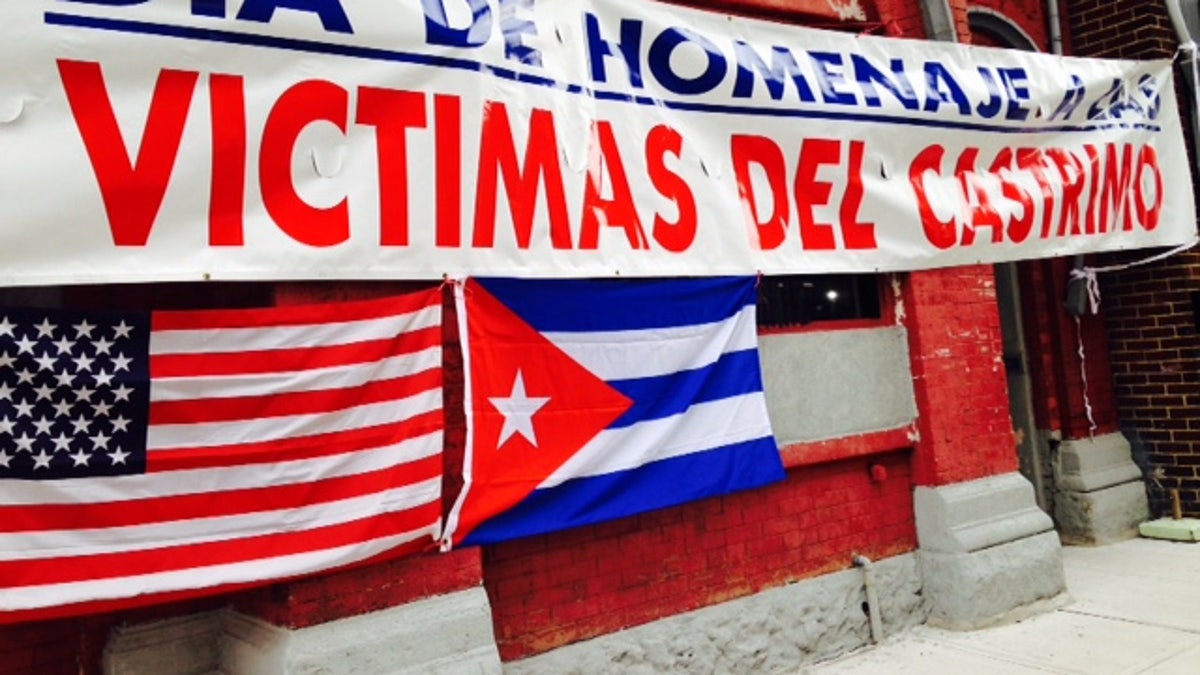
Banner outside Union City headquarters of Former Cuban Political Prisoners says: "Day of Homage to Castro's Victims." (Liz Llorente)
UNION CITY, N.J. – Norma Edmiston does not normally have champagne with her scrambled eggs at breakfast.
But on Saturday morning, she did.
Hours earlier, news of former Cuban leader Fidel Castro’s death had been announced, and like many Cuban-Americans around the country, Edmiston celebrated the moment she thought would never come.
“We were waiting for this for a long time,” Edmiston said to FoxNews.com while she and her husband ate lunch at a popular Cuban café, El Artesano, situated on Bergenline Avenue in Union City – once a Cuban exile enclave. “I was on the telephone this morning with friends and family, we were all saying ‘Congratulations!’ My husband and I knew we had to break out the champagne.”
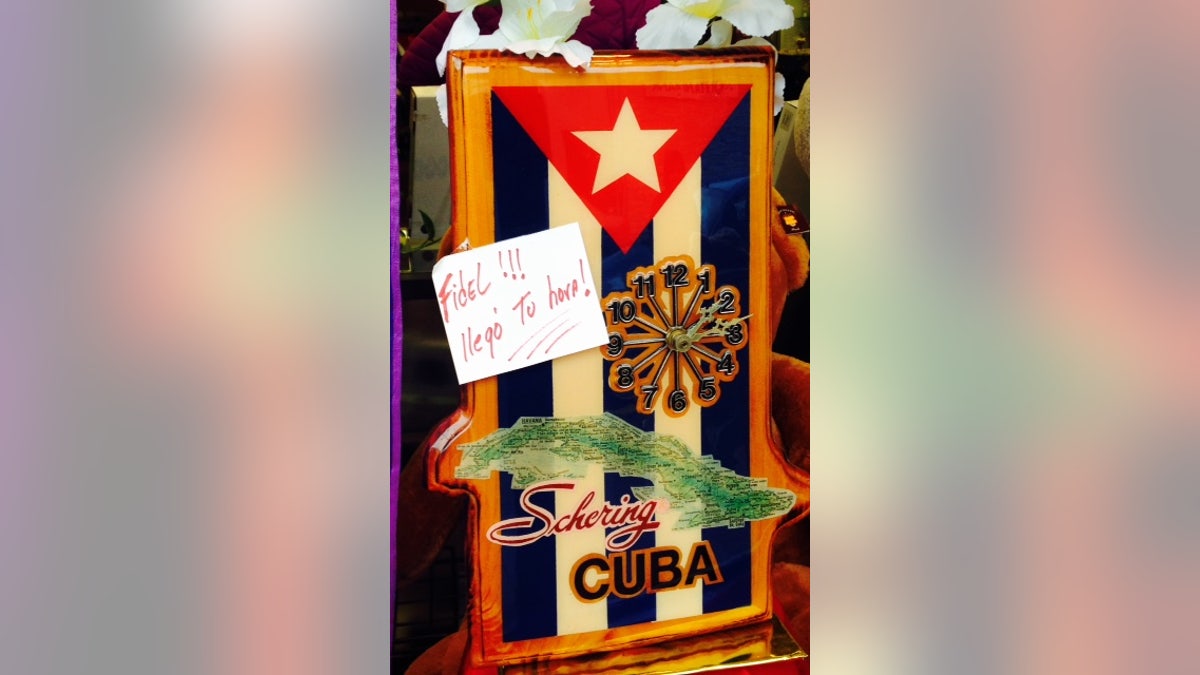
Storefront sign in Union City, NJ that says: "Fidel, your hour has come." (Liz Llorente)
Several stores along Bergenline Avenue, which in the 1960’s saw thousands of Cubans settle there to begin new lives, propped up hand-written signs on their windows saying “Castro, your hour has come,” and “Viva Cuba Libre!.”
At El Artesano, where Cubans who long ago moved away to the suburbs – for bigger homes, better schools and driveways and bigger yards – often come back for black beans, pork, and other Cuban dishes that taste like they did at home, Fidel Castro was the topic of conversations at nearly every table.
Older Cubans recalled what the Communist revolution – what “Fidel” – took away from them, ranging from homes, businesses, possessions and relatives.
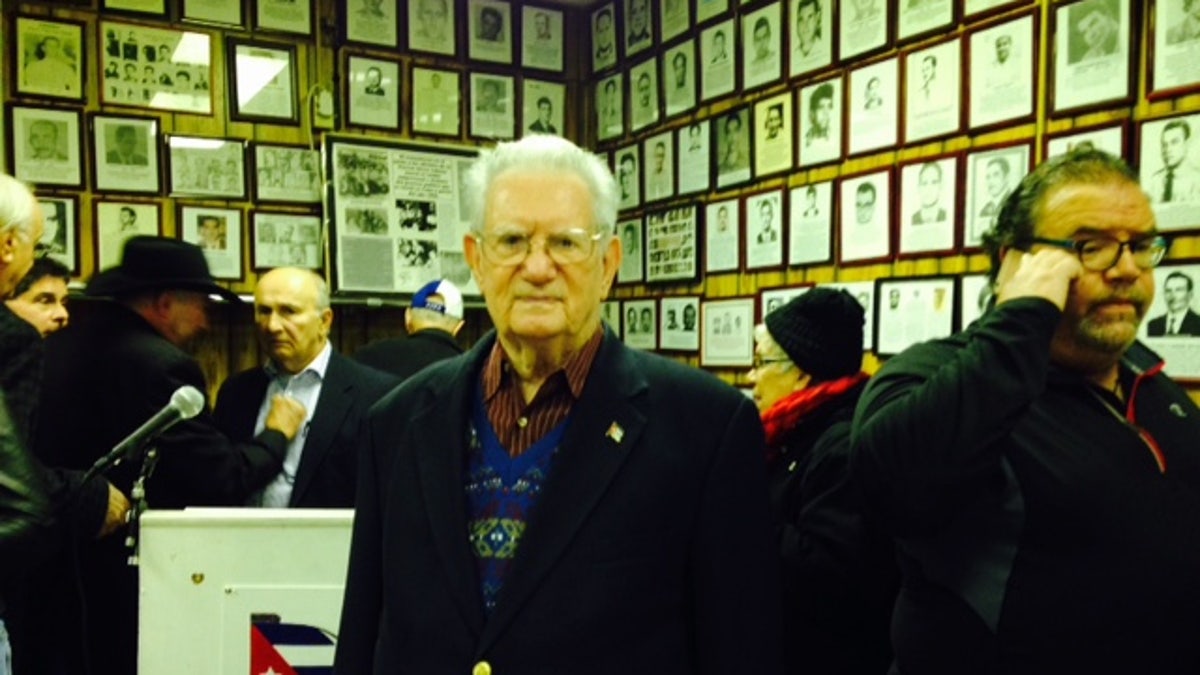
Former Cuban political prisoner Israel Abreu. (Liz Llorente)
Younger Cubans recounted what they had grown up hearing about “Fidel” from their parents, and spoke of all the relatives in Cuba they did not know, or know well, because of the separation of families that occurred after the revolution.
And many Cubans of all ages said that any positive feelings they had about Fidel Castro’s death were tempered by sadness over deceased mothers, fathers, and grandparents who had waited for this day, but did not live to see it.
“I hope he burns in Hell,” said Otilea Garcia, an elegantly dressed diminutive woman sitting by herself at one table, having Cuban espresso and an empanada. “Fidel Castro was Lucifer. They say he supported the struggle against Apartheid, but meanwhile inside Cuba he suppressed his own people, of all races. His death is long overdue.”
Garcia spoke with visible anger and pain about leaving her father behind in Cuba in 1972 when she decided to flee to the United States with her young son.
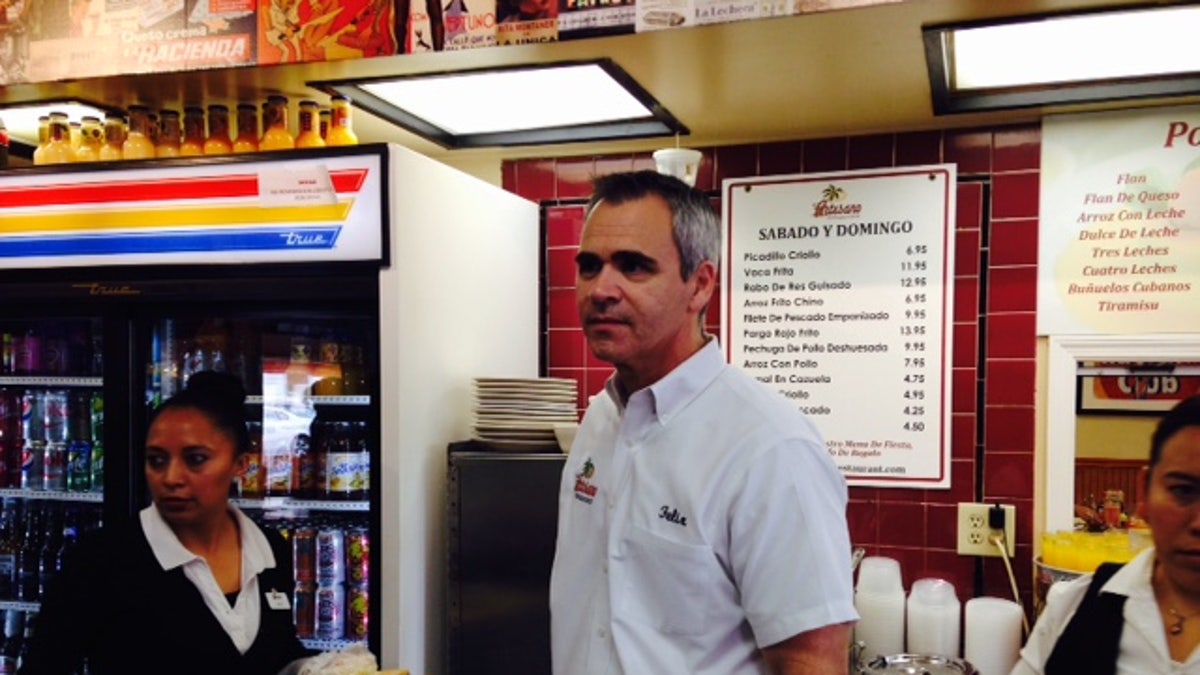
Felix Alfonso, whose family owns El Artesano cafe (Liz Llorente)
“My father said ‘You’re taking the most important thing in this world to me,’ he was talking about my son,” said Garcia, as tears welled in her eyes. “I could not go to Cuba when close relatives died because Castro would not allow us back, not even for funerals. May he rot in Hell.”
Felix Alfonso, whose family owns El Artesano, thought of his late father, whom the Fidel Castro regime imprisoned for two years for buying a loaf of bread through the black market – a way that many Cubans, who can afford it, get around Cuba’s food rationing.
“When I heard that Fidel died, it was great news,” Alfonso said, as he paused for a few minutes from tending to customers in the busy restaurant his parents opened more than 30 years ago. “It seemed at one point like he would never, ever die, like it would never end. He outlived a lot of people who left Cuba because of him, people like my father and other relatives.”
“You don’t want to wish death on anybody,” he said, “but what so many Cuban people went through because of Fidel Castro makes them angry” and hateful towards the former dictator.
“On the very day I was born in Cuba, the day my father got a son, he saw Castro’s government confiscate his small café that he had in Matanzas.”
But while Alfonso felt the mix of shock and some pleasure over Castro’s death that many Cuban-Americans expressed on Saturday, like them, he too said that Cuba’s problems did not die with the revolutionary icon.
“There’s still a Castro in power,” Alfonso said.
Edminton, who left Cuba in 1970 at the age of 15, still felt anger and resentment over being forced by her teachers to write compositions glorifying Fidel Castro and Communism.
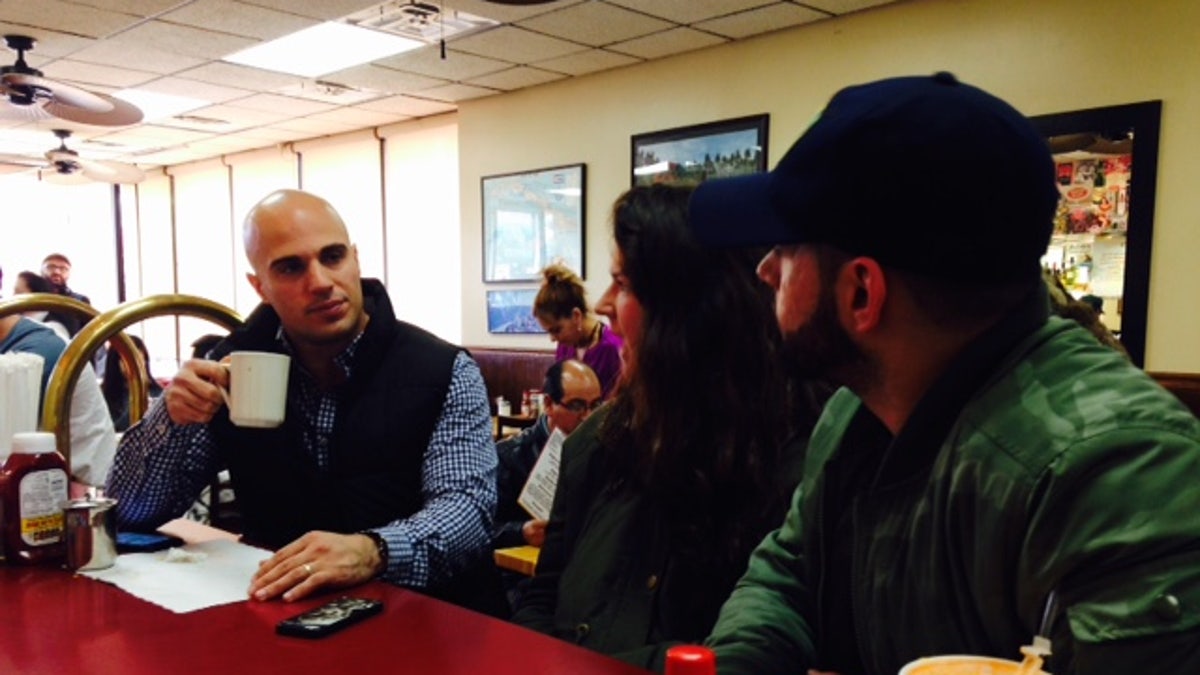
Cuban-American millennials discuss Fidel Castro's death. (Liz Llorente)
“We had to write about how great the revolution was,” she said, “and I did, even though I did not believe that, but you had to do it. I recited all the Communist lines. Before I went to school, my parents would remind me to say good things about Fidel and the revolution, even though within my home we were against him and the government.”
One day, when she took a slice of tomato from the school kitchen because she was hungry, the then 7th grader was sent away to labor camp as punishment.
Jose Miguel Lobaina, 73, wasn’t sure he’d outlive the Cuban leader who himself outlived about 10 U.S. presidents, most of his foes in exile, as well as many of the journalists who had written advance obits of him.
Lobaina said he is ecstatic, and feels hope for Cuba’s future.
“This man was arguably smart,” Lobaina said, “but he was Machiavellian. He was egomaniacal. His legacy is that he was the root of the social, economic and political destruction of Cuba. But I’ll tell you what he failed to destroy – the hope of the Cuban people. Today the hope of freedom is reborn in Cuba.”
Fernando Villar, 30, grew up hearing about the devastation that Castro’s rule had caused.
When he heard about his death, he said, “it was surreal.”
FORMER CUBAN LEADER FIDEL CASTRO DIES AT 90
Villar expected to be ecstatic when the day of Fidel Castro’s death arrived, but he felt somewhat down.
His father, who had been a political prisoner in Cuba and died two years ago, was not with him to share the news, to reflect on it.
“Fidel Castro should be reviled,” Villar said. “History should not absolve him.”
Two blocks down, at the headquarters of a former Cuban political prisoners group, dozens of men who had served time in Castro’s jails for demanding human rights and criticizing the revolution gathered to pay homage to those who died in prison and others who were executed.
The walls of the space where these exiles, now in their 70’s, 80’s and 90’s, meet every week are lined with black and white photos of those who they say were executed by firing squads in Cuba because of their political beliefs.
“We decided to gather, not to celebrate Fidel Castro’s death, but to remember and honor his victims, whose names are not known like his is, and whose fate most of the world does not know about,” said Israel Luis Abreu, a founder of the group who spent more than a dozen years in a Cuban jail. “As we see the praise for this dictator pour in from around the world, we feel obligated to remind everyone aboiut his victims.”
Evaristo Sotolongo, who spent 17 years in a Cuban jail, said: “This is our sanctuary, a refuge for those of us who survived this dictator’s oppression and brutality. Castro has been a carcass, really, for some time now. We say ‘Good riddance,’ to him and President Obama, who will be gone in his own way before too long. He gave away too much to Raul Castro without getting a promise of a better life for the Cuban people.”
Sergio Gatria, a longtime anti-Castro activist, pointed to all the photos of the dead that covered the walls.
“It doesn’t bring me joy that this is how it ended for Fidel,” he said. “Here’s a beast who should have gone to trial for crimes against humanity, who should have gone to jail, or been executed like Saddam Hussein. Instead, he lived a full 90 years, a lot of it in comfort. He died in his home, he never paid the consequences for all the harm he did to so many people, to an entire country.”









































